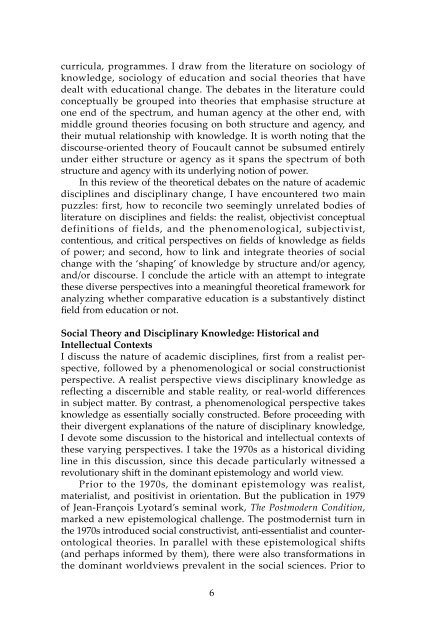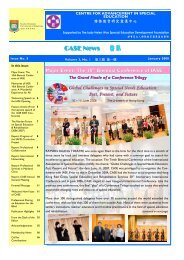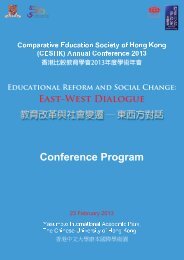Comparative Education Bulletin - Faculty of Education - The ...
Comparative Education Bulletin - Faculty of Education - The ...
Comparative Education Bulletin - Faculty of Education - The ...
You also want an ePaper? Increase the reach of your titles
YUMPU automatically turns print PDFs into web optimized ePapers that Google loves.
curricula, programmes. I draw from the literature on sociology <strong>of</strong><br />
knowledge, sociology <strong>of</strong> education and social theories that have<br />
dealt with educational change. <strong>The</strong> debates in the literature could<br />
conceptually be grouped into theories that emphasise structure at<br />
one end <strong>of</strong> the spectrum, and human agency at the other end, with<br />
middle ground theories focusing on both structure and agency, and<br />
their mutual relationship with knowledge. It is worth noting that the<br />
discourse-oriented theory <strong>of</strong> Foucault cannot be subsumed entirely<br />
under either structure or agency as it spans the spectrum <strong>of</strong> both<br />
structure and agency with its underlying notion <strong>of</strong> power.<br />
In this review <strong>of</strong> the theoretical debates on the nature <strong>of</strong> academic<br />
disciplines and disciplinary change, I have encountered two main<br />
puzzles: first, how to reconcile two seemingly unrelated bodies <strong>of</strong><br />
literature on disciplines and fields: the realist, objectivist conceptual<br />
definitions <strong>of</strong> fields, and the phenomenological, subjectivist,<br />
contentious, and critical perspectives on fields <strong>of</strong> knowledge as fields<br />
<strong>of</strong> power; and second, how to link and integrate theories <strong>of</strong> social<br />
change with the ‘shaping’ <strong>of</strong> knowledge by structure and/or agency,<br />
and/or discourse. I conclude the article with an attempt to integrate<br />
these diverse perspectives into a meaningful theoretical framework for<br />
analyzing whether comparative education is a substantively distinct<br />
field from education or not.<br />
Social <strong>The</strong>ory and Disciplinary Knowledge: Historical and<br />
Intellectual Contexts<br />
I discuss the nature <strong>of</strong> academic disciplines, first from a realist perspective,<br />
followed by a phenomenological or social constructionist<br />
perspective. A realist perspective views disciplinary knowledge as<br />
reflecting a discernible and stable reality, or real-world differences<br />
in subject matter. By contrast, a phenomenological perspective takes<br />
knowledge as essentially socially constructed. Before proceeding with<br />
their divergent explanations <strong>of</strong> the nature <strong>of</strong> disciplinary knowledge,<br />
I devote some discussion to the historical and intellectual contexts <strong>of</strong><br />
these varying perspectives. I take the 1970s as a historical dividing<br />
line in this discussion, since this decade particularly witnessed a<br />
revolutionary shift in the dominant epistemology and world view.<br />
Prior to the 1970s, the dominant epistemology was realist,<br />
materialist, and positivist in orientation. But the publication in 1979<br />
<strong>of</strong> Jean-François Lyotard’s seminal work, <strong>The</strong> Postmodern Condition,<br />
marked a new epistemological challenge. <strong>The</strong> postmodernist turn in<br />
the 1970s introduced social constructivist, anti-essentialist and counterontological<br />
theories. In parallel with these epistemological shifts<br />
(and perhaps informed by them), there were also transformations in<br />
the dominant worldviews prevalent in the social sciences. Prior to<br />
6
















